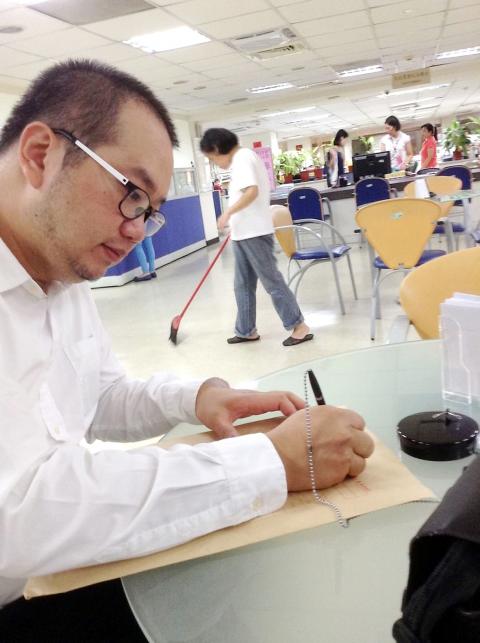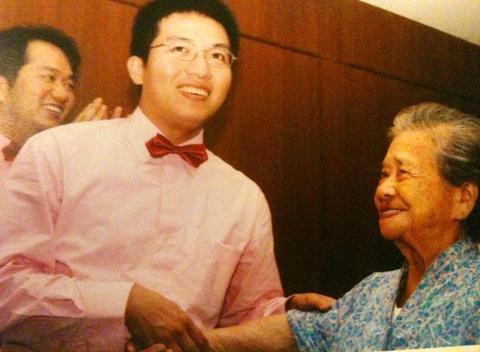A few days after more than 65,000 lesbians, gays, bisexuals, transgenders (LGBT) and supporters turned out for the 12th Taiwan LGBT Pride Parade (台灣同志遊行) in downtown Taipei, The New York Times published a report titled “For Asia’s gays, Taiwan stands out as beacon,” lauding the nation’s open society.
“Taiwan is an inspiration for much of Asia,” the report quoted Grace Poore, director of Asia and Pacific island programs at the International Gay and Lesbian Human Rights Commission.
“They are way ahead of their neighbors,” she added.

Photo: Chiu Shao-wen, Taipei Times
The report said that, “With its lively news media, panoply of grassroots organizations and a robust, if sometimes noisy, democracy, this self-governing island has become a beacon for liberal political activism across Asia.”
HOSTILITY REMAINS
On the surface, Taiwan seems more gay-friendly than its neighboring countries — such as Brunei, China, Indonesia, Malaysia, Myanmar, Singapore and the two Koreas — where homosexuality is taboo or even a crime.

Photo courtesy of Nelson Chen
But in reality, discrimination and oppression against gays and lesbians still exist everywhere in Taiwan’s society, where anti-gay activists make every effort to spread hatred.
Not long ago, wedding cake company Isabelle Taiwan Co (台灣伊莎貝爾食品公司) launched a series of commercials on the theme “everyone is equal before love” (在愛面前.人人平等). One commercial told the story of a Taiwanese gay couple, who have been together for almost 30 years (https://www.youtube.com/watch?v=wSlXra0fJuU).
Some Christian groups immediately staged a protest, calling for a boycott against the company’s wedding cakes until it withdraws the commercial.
Early this month, Pastor Chen Yuan-chang (陳元章) of the Missionary Center of Taiwan (台灣宣教中心) launched a campaign on Facebook, calling on consumers to boycott Starbucks Coffee Corp for its support of marriage equality.
“Starbucks donates 10 percent of its earnings to support homosexuality. If you buy the company’s products, then you will be helping Satan do evil,” the pastor wrote. Many of his followers clicked “Like” on the post.
Gay writer Rob Lo (羅毓嘉) challenged Chen’s double standard.
“Show some backbone, will you?” Lo said. “If you are against homosexuals, then don’t promote your campaign through Facebook, which was co-founded by a gay.” Lo was referring to the social networking giant’s co-founder Chris Hughes, who is openly gay and married his boyfriend in 2012.
Following Chen’s logic, perhaps anti-gay Christians should avoid companies such as IBM, Google and Microsoft, which also support gay rights. Presumably, they should avoid “helping Satan to do evil” by eschewing iPhones and all other Apple products, too, as the company’s CEO Tim Cook has come out.
LGBT CANDIDATES
These examples show that Taiwan’s LGBT community still faces great pressure every day, while legal protections are absent so far. As a result, some gays and lesbians are taking a more active role by throwing themselves into the upcoming nine-in-one elections, hoping to make changes from within the system.
In northern Taiwan, Nelson Chen (陳敬學) is running for warden of Dazhi Borough (大直里) in Taipei’s Zhongshan District (中山), and Lee Chien-yu (李建裕) is running for warden of Qingjiang Borough (清江里) in Taipei’s Beitou District (北投).
Chen, who is famous for holding a same-sex wedding with his boyfriend in 2006, pledges to build a more diverse community, where different groups can coexist in peace. He admitted that it was hurtful when a voter humiliated him by throwing his business card on the ground.
Meanwhile, the People Are The Boss is nominating lesbian candidate Lin Shih-han (林詩涵) for the Chiayi mayoral election and gay candidate Chiu Hao-ting (邱皓庭) for the Yanping Borough (延平里) warden election in New Taipei City’s Luzhou District (蘆洲).
Also, Green Party Taiwan’s Wang Chung-ming (王鐘銘) is running for councilor again in New Taipei City’s first electoral district. Wang comes highly recommended by a number of non-governmental groups for his devotion to social work. In southern Taiwan, the Green Party’s Liang Yi-chih (梁益誌) is running for councilor in Greater Kaohsiung’s Sanmin District (三民). As a former convener of the Kaohsiung Pride Parade Alliance (高雄同志遊行聯盟), Liang is the city’s very first openly gay councilor candidate, and has worked in the past on environmental protection and other social issues.
Despite much pressure, these candidates are stepping out to build a fair and just society for all.
VOTE FOR A BETTER SOCIETY
Some candidates are notorious for their hostility to homosexuals. Take for example Chinese Nationalist Party (KMT) Taipei City Councilor Li Keng Kuei-fang (厲耿桂芳), who is running for re-election. She repeatedly blocks the Taipei City Government’s funding on various gay-friendly activities, warning that promoting same-sex relationships would only spread AIDS, as homosexuals are “prone to having AIDS.”
Li Keng, a member of the Home of Christ (台北基督之家), is serving concurrently as a member of the KMT’s Central Standing Committee, which is the ruling party’s highest governing body. The KMT should withdraw her nomination in order to save its image.
On Nov. 29, as many as 11,130 representatives at all levels will be elected via the largest elections in Taiwan’s history. As the elections are only two days away, Taipei Watcher would like to encourage all LGBT members and supporters to vote. After all, if you do not care about your rights, who will?
Most studies show that the LGBT people account for 3.5 to 5 percent of the total population. In other words, among the approximately 23.4 million Taiwanese people, up to 1.2 million people are homosexuals who are deprived of their basic rights.
So let’s cast our ballots this Saturday.
Together, we can make Taiwan a true beacon for Asia’s liberal democracy.

When Taiwan was battered by storms this summer, the only crumb of comfort I could take was knowing that some advice I’d drafted several weeks earlier had been correct. Regarding the Southern Cross-Island Highway (南橫公路), a spectacular high-elevation route connecting Taiwan’s southwest with the country’s southeast, I’d written: “The precarious existence of this road cannot be overstated; those hoping to drive or ride all the way across should have a backup plan.” As this article was going to press, the middle section of the highway, between Meishankou (梅山口) in Kaohsiung and Siangyang (向陽) in Taitung County, was still closed to outsiders

US President Donald Trump may have hoped for an impromptu talk with his old friend Kim Jong-un during a recent trip to Asia, but analysts say the increasingly emboldened North Korean despot had few good reasons to join the photo-op. Trump sent repeated overtures to Kim during his barnstorming tour of Asia, saying he was “100 percent” open to a meeting and even bucking decades of US policy by conceding that North Korea was “sort of a nuclear power.” But Pyongyang kept mum on the invitation, instead firing off missiles and sending its foreign minister to Russia and Belarus, with whom it

President William Lai (賴清德) has championed Taiwan as an “AI Island” — an artificial intelligence (AI) hub powering the global tech economy. But without major shifts in talent, funding and strategic direction, this vision risks becoming a static fortress: indispensable, yet immobile and vulnerable. It’s time to reframe Taiwan’s ambition. Time to move from a resource-rich AI island to an AI Armada. Why change metaphors? Because choosing the right metaphor shapes both understanding and strategy. The “AI Island” frames our national ambition as a static fortress that, while valuable, is still vulnerable and reactive. Shifting our metaphor to an “AI Armada”

The Chinese Communist Party (CCP) has a dystopian, radical and dangerous conception of itself. Few are aware of this very fundamental difference between how they view power and how the rest of the world does. Even those of us who have lived in China sometimes fall back into the trap of viewing it through the lens of the power relationships common throughout the rest of the world, instead of understanding the CCP as it conceives of itself. Broadly speaking, the concepts of the people, race, culture, civilization, nation, government and religion are separate, though often overlapping and intertwined. A government